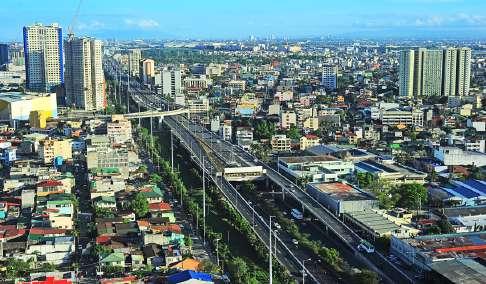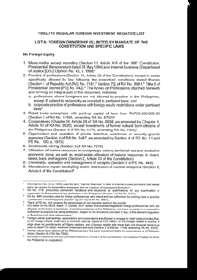








The 2024 Philippine Investment Guidebook
Disclaimer
This publication aims to offer a broad overview of the legal framework necessary for establishing a business presence in the Philippines. It serves merely as informational material and is distributed solely for informational purposes. The German-Philippine Chamber of Commerce and Industry, along with any contributors to this guide, accept no responsibility for the accuracy, completeness, or currentness of the information contained in this brochure
Imprint
Publisher
AHK Philippinen | German-Philippine Chamber of Commerce and Industry, Inc 8F Doehle Haus Manila, 30-38 Sen Gil Puyat Avenue | Barangay San Isidro | 1234 Makati City Metro Manila | Philippines Tel +63 2 8519 8110 info@gpcci.org www.philippinen.ahk .de
Editors / Contributors
Elenee
Photo Credits
Canva


Yves Aguilos
Ventura Isabelle Cebu Fabian Oehlschlaeger Charlotte Bandelow Table of Contents 2 5 7 9 11 13 16 17 21 22 Foreword Country Overview Economic Overview Sector Overview General Business Procedures in the Philippines Business and Regulatory Landscape Immigration Tax and Business Incentives Labor and Employment GPCCI Services and Partners
GPCCI Premium Partners 1 | 2024 Philippine Investment Guidebook
Foreword

 H.E. Andreas Pfaffernoschke
H.E. Andreas Pfaffernoschke
Ambassador Embassy of the Federal Republic of Germany in Manila
The German Embassy in Manila shares the vision and commitment of the German–Philippine Chamber of Commerce and Industry, Inc In expanding the reach to the business community. The 2024 Philippine Investment Guidebook is a valuable publication that highlights the great potential of the Philippines to interested investors
The Philippines is a country with an emerging market, skilled labor force, and growing industries for steadfast economic growth. Germany has established trade relations with the Philippines being its top trade partner in the EU I am optimistic that more German businesses and other foreign investors will appreciate these values and choose the Philippines as their investment destination.
Working closely with GPCCI and our Philippine counterparts, the German Embassy is committed to promoting and strengthening Philippine-German business relations. I hope that our readers find this publication informative and will be encouraged to visit and invest in the Philippines. Danke! Salamat!
 Ms. Marie Antoniette Mariano President German-Philippine Chamber of Commerce and Industry
Ms. Marie Antoniette Mariano President German-Philippine Chamber of Commerce and Industry
The Philippines, with its rich natural resources, growing skilled workforce, burgeoning industries, and strong domestic markets, stands as a compelling destination for foreign investment. As an archipelagic nation poised for economic growth, the Philippines offers a unique blend of opportunities that are especially attractive to German businesses seeking to expand their global footprint The country's rapidly evolving competitive markets and promising business potential underscore the importance of considering the Philippines as a prime investment location
This guidebook serves as a comprehensive resource, providing an overview of the Philippines' economic performance, key industries, and designated economic zones It also delves into the robust trade relations between the Philippines and Germany, highlighting the synergies and collaborative opportunities that exist between our two nations. Beyond this, the publication offers detailed insights into the processes, requirements, and policies essential for conducting business in the Philippines, equipping potential investors with the necessary knowledge to navigate the business landscape effectively
The German-Philippine Chamber of Commerce and Industry, Inc. (GPCCI) is committed to fostering connections between German and Philippine businesses With this commitment in mind, we proudly present the "2024 Philippine Investment Guidebook." This guide is tailored for investors interested in exploring the Philippines' investment opportunities, providing a thorough understanding of what the country can offer as a sound and strategic investment destination
We hope this guidebook will be an invaluable tool for your investment journey and will inspire you to consider the Philippines as a vibrant and dynamic market for your business ventures
2024 Philippine Investment Guidebook | 2
 Hon. Alfredo E. Pascual Secretary Department of Trade and Industry
Hon. Alfredo E. Pascual Secretary Department of Trade and Industry



3 | 2024 Philippine Investment Guidebook
 Hon. Ernesto V. Perez, CPA Director General Anti-Red Tape Authority
Hon. Ernesto V. Perez, CPA Director General Anti-Red Tape Authority
The German – Philippine Chamber of Commerce and Industry, Inc (GPCCI) has been a valued partner of the Anti-Red Tape Authority (ARTA) since our partnership was sealed in 2023. We commend their commitment to connecting German and Philippine business communities especially with the great potential of the Philippines as a destination for foreign investors
Through the 2024 Philippine Investment Guidebook, foreign businesses and investors can be more aware of why the country is a sound place to invest in With ARTA’s commitment to streamline, simplify, and strengthen government processes for doing business, we aim to help investors have a smooth and efficient experience in setting up their business in the Philippines This commitment echoes President Ferdinand R Marcos Jr ’s priority to promote bureaucratic efficiency in the Philippines.
Let us continue collaborating to make the Philippines an easy place to do business, replacing red tape with red carpet, to foster economic growth and development for the realization of a “Bagong Pilipinas.”


2024 Philippine Investment Guidebook | 4



5 Reasons to diversify your business in th
1 2 3
Strategic Location and Access to ASEAN Markets
The Philippines is strategically located in Southeast Asia, serving as a gateway to the ASEAN market which comprises over 650 million people. This strategic location makes it an ideal hub for logistics, manufacturing, and distribution across Asia.
China +1 Strategy
German companies, having established significant investments in China over the past years, are now actively looking to expand their geographic footprint in Asia for strategic diversification. Recognizing the need to mitigate risks and capitalize on new opportunities, the Philippines has emerged as a key diversification destination.
Globally Renown Skilled Workforc
The Philippines b young, and highly workforce proficie
The country has o English literacy ra is a significant ad foreign businesse effective commun management skil
Metro Manila Metro Cebu Metro Davao 5 | 2024 Philippine Investment Guidebook
The Philippines
The Philippines, a middle-income country with a vibrant population of over 110 million, offers a youthful and highly literate workforce proficient in English, making it an attractive hub for global business. Positioned strategically in Southeast Asia, it provides direct access to major markets and boasts a welcoming environment with strong government incentives for foreign investment. Key sectors like IT, manufacturing, renewable energy, and tourism offer diverse opportunities. Additionally, competitive labor costs, ongoing infrastructure improvements, and a commitment to sustainable practices further enhance its appeal to international businesses, positioning the Philippines as a dynamic player in the regional and global economy.
295,633
Over 119 Million 1.5%
388.2 per sq. km
Filipino; English
Democratic Presidential Republic
Philippine Peso
EUR 1 = PHP 61 (as of May 2024)
USD 1 = PHP 57
e Philippines
4 5
ned Young and ce oasts a large, y skilled ent in English. one of the highest ates in Asia, which vantage for es requiring nication and ls.
Growing Economy and Development Initiatives
The Philippines has been one of the fastest-growing economies in Asia. The government's commitment to infrastructure development through programs like "Build, Better, More" enhances the attractiveness for foreign investment by improving roads, airports, and urban transit systems.
Favorable Investment Policies
The Philippines offers various incentives for foreign investors, including tax holidays, tax breaks, and other fiscal incentives. The government has also been working on improving the ease of doing business to attract more foreign direct investment.
Growth
Languages
of Government
Area Capital Population Population
Population Density Official
Form
Currency
Manila
annually

Economic Overview
In 2023, the Philippine economy exhibited robust growth, demonstrating resilience amidst global economic challenges The country's GDP growth was notably driven by strong domestic consumption, increased government infrastructure spending, and a rebound in tourism, which benefited from the easing of COVID-19 restrictions. Key sectors such as services, construction, and manufacturing saw significant expansions, contributing to the overall economic upturn. Despite facing external pressures such as inflation and global supply chain disruptions, the Philippines managed to maintain a relatively stable economic environment. Overall, the Philippine economy in 2023 showcased its potential for sustained growth and its increasing appeal as a destination for international investors.
-10 -5 0 5 10 2019 2020 2021 2022 2023 0 1 2 3 4 5 6 2021 2022 2023
GDP Growth 2023 5.6% USD 26.6 B Electronic Products USD 12.5 B Transport Equipment Inflation Rate 5.6% Credit Rating USD 20.1 B Mineral Fuels and Related Materials USD 41.9 B Electronics USD 4 B Other Manufactured Goods USD 3.1 B Other Mineral Products Top Imports / Exports 2023 BBB+ Baa2 BBB S&P Moody’s Fitch 7 | 2024 Philippine Investment Guidebook

Philippine - Germany Trade 0 1 2 3 4 5 2021 2022 2023 Total Exports to Germany in Million USD Total Imports from Germany in Million USD Total Trade in Million USD Employment Rate increase from 2022 Median Age Top Trading Partners Imports Exports Rank 1 People’s Republic of China USD29.4B Rank 2 Indonesia USD11.5B Rank 3 Japan USD10.3B Rank 13 Germany USD2.2B Rank 1 United States of America USD11.5B Rank 2 People’s Republic of China USD10.9B Rank 3 Japan USD10.5B Rank 10 Germany USD2.5B 25.3 Rank 1 Germany Rank 2 Netherlands Rank 3 Singapore 2023 393.28 B 333.61 B 21.45 B in PHP 12.3% Underemployment Rate 4.3% Unemployment Rate 95.7% 2023 Labor Force Survey Labor Force Participation Rate 95.7% 1.16 T Total Approved Investments Foreign Direct Investments 56% Top Foreign Direct Investment Approvals 2.94 2.05 4.99 2.78 1.95 4.72 2.49 2.17 4.65 2024 Philippine Investment Guidebook | 8
Sector Overview

Agribusiness
The Philippine government envisions that as an agribusiness industry, the country can take the most advantage of various emerging high value crops. The government is also committed to strengthen agroprocessing and its linkage to the production process and deepen its participation in global value chains

Manufacturing
Accounting for 20% of the national GDP, manufacturing is an important industry in the Philippines and is anticipated to even grow in the coming years Noting that electronics and food are the two of the topmost manufacturing sectors in the country, the industry is also responsible for generating 200,000 jobs just in the last quarter of 2023. The Philippine government also envisions creating a manufacturing innovation ecosystem in hopes for the Philippines to have a globally competitive and innovative manufacturing industry

BusinessProcessOutsourcing
Contributing almost 7 5% of the national GDP in 2021, the IT-BPO industry in the Philippines is vastly growing. In 2023, the industry incurred about EUR 33 billion in revenues and employed 1.7 million full-time employees. With an expected additional EUR 27.5 billion and about 1.1 million new jobs by 2028, the Philippines seeks to maintain its standing as the world capital in IT-BPM

RenewableEnergy
The Philippines has initiated efforts and strategies to incorporate and adopt renewable energy sources the Philippine government are taking significant steps to drive its renewable energy goals to reach 35% by 2030 and 50% by 2040. . Renewable energy remains to be a key sector and potential investment area for development in the Philippines.


9 | 2024 Philippine Investment Guidebook

Healthcare
The Philippines allocates about 2% of its national GDP to healthcare services and equipment, reflecting the country's dedication to enhancing healthcare access for all This investment supports a robust healthcare sector characterized by highly skilled and well-spoken healthcare professionals recognized globally. These workers are key in maintaining high standards of healthcare both locally and internationally,

Retail
Being driven by personal consumption and overseas FIlipino workers (OFWs) remittances and the recent liberalization of the sector for foreign investors, the retail sector is one of the most stable segments in the Philippine market. With the rise of e-commerce and growing number of supermarkets and small stores, the retail sector is projected to grow by 5% annually

InfrastructureandConstruction
With the government’s flagship infrastructure program, “Build-Better-More”, the Philippines is committed to usher in economic development through more and better infrastructure These projects for physical connectivity (roads and expressways), water & agricultural resources, health, digital connectivity, and power & energy

TourismandHospitality
In 2023, the Philippines welcomed 5 million international tourists, generating about EUR 8 billion in tourism receipts Showcasing Filipino hospitality, the Department of Tourism expressed its commitment to further grow the industry. Having garnered global accolades and boasting breathtaking natural attractions, the Philippines remains a premier destination in Southeast Asia.


2024 Philippine Investment Guidebook | 10
Conduct A Market Research
Do a thorough market research to understand the competitive landscape, demand for your product or service, and economic conditions. The German-Philippine Chamber of Commerce and Industry (GPCCI) can assist companies in navigating the Philippine market, providing valuable insights and support. Additionally, during this phase, research potential tax incentives that your business might qualify for, which can significantly affect your financial planning.



Register Your Business
General Business Procedure in the Ph
Obtain Necessary Pe


Register your business through the Securities and Exchange Commission’s Electronic Simplified Processing of Application for Registration of Company (SEC-ESPARC) This platform streamlines the process of submitting the necessary documents and forms required for incorporation. You will need to reserve your company name, submit the Articles of Incorporation, and other foundational documents through this online system.

Acquire all necessary permit government units (LGUs) This clearance, Mayor's permit (also and other local authorizations location and industry. These p operation within municipalities a

11 | 2024 Philippine Investment Guidebook
hilippines
ermits and Licenses
ts and licenses from local includes securing a Barangay known as a business permit), depending on your business ermits are essential for legal and regions.







General Compliance
Depending on the nature of your business, apply for special permits or licenses that are required for your specific industry This could include permits from the Food and Drug Administration (FDA) for food and drug businesses, environmental permits from the Department of Environment and Natural Resources (DENR), or other sector-specific authorizations.



Tax Registration
Register with the Bureau of Internal Revenue (BIR) to obtain your business's tax identification number (TIN), register for VAT or other applicable taxes, and get authority to print receipts and invoices. This registration is crucial for compliance with tax laws and for conducting business transactions.


2024 Philippine Investment Guidebook | 12
Business and Regulatory Landscape

The Philippines offers a compelling business landscape for foreign direct investments (FDIs), governed by distinctive foreign ownership restrictions that mandate careful consideration by foreign investors The nation sets limitations on in certain sectors to safeguard local interests Despite these constraints, there have been significant recent investment policy developments aimed at making the environment more conducive for foreign investors.
These updates are particularly notable in various sectors, continually evolving to provide fresh opportunities and considerations for those looking to tap into the Philippine market. This regulatory framework ensures that the investment climate remains both vibrant and structured
Navigating Foreign Investments in the Philippines
The Foreign Investments Act (FIA) serves as the cornerstone legislation overseeing foreign investments within the Philippines Typically, foreign investments encounter some restrictions, except for those explicitly outlined in the Constitution and various pertinent statutes.
Additionally, the Omnibus Investment Code of 1987 outlines a thorough set of incentives for qualified investors, detailing the fundamental policies and regulations governing foreign investments.
(Refer to page 18 for details on fiscal incentives)
Business Structures in the Philippines
Organized under PH Laws
Sole Proprietorship
A business structure owned by a single individual who handles all the operations and is personally liable for all debts and legal actions against the business
Partnership
A business organization formed by two or more people who agree to share in the profits or losses of a business. Partnerships can be general or limited, where general partners manage the business and are personally liable, while limited partners contribute financially but have limited liability and no management authority
Corporation
A legal entity that is separate and distinct from its owners, known as shareholders. Corporations can raise capital through the sale of shares and are governed by a board of directors They offer limited liability to their owners and are subject to more regulatory requirements.
13 | 2024 Philippine Investment Guidebook

Domestic- vs Export-oriented Enterprises
Foreign investment policies differ significantly between domestic-market enterprises and exportoriented ones. Domestic-market enterprises often face more stringent foreign ownership restrictions to protect local businesses and employment In contrast, export-oriented enterprises enjoy fewer restrictions and are incentivized to attract foreign capital, facilitating technology transfer and boosting the country's export capabilities. This dichotomy aims a competitive local market while still engaging actively in the global economy.
Foreign Investment Negative List
The Foreign Investment Negative List (FINL) is a critical document that specifies the sectors where foreign investment is restricted or prohibited. Updated periodically, this list reflects the government's strategic economic goals and security concerns Industries often included on this list are those considered vital to national interest, such as defense-related activities, certain agricultural products, and businesses affecting public health and morals. The list serves as a clear guideline for foreign investors plotting their entry into the Philippine market.
Public Utilities
Foreign ownership in public utilities is particularly sensitive due to their critical nature in national infrastructure. The constitution limits foreign ownership in this sector to ensure that essential services such as water, electricity, and telecommunications are primarily under Filipino control. However, recent legislative changes suggest a potential loosening of these restrictions, aimed at attracting more foreign investments to improve the quality and reliability of these crucial services.


Organized under Foreign Laws
Branch Office
An extension of a foreign company that carries out business activities in the Philippines under the name of the foreign parent company It can earn income from its operations in the Philippines and is fully liable for its actions as it is not a separate legal entity.
Representative Office
A non-income-generating office set up by a foreign company to deal with the company’s clients in the Philippines for liaison purposes, such as promoting the parent company’s products, providing information, or conducting quality control It cannot engage in any commercial operations.
Headquarters
Regional Headquarters (RHQ) and Regional Operating Headquarters (ROHQ) in the Philippines serve multinational companies. RHQs handle administrative functions without earning local income, while ROHQs can engage in income-generating activities like management and coordination services for regional affiliates
2024 Philippine Investment Guidebook | 14
Scan QR to read the 12th Regular FINL
Recent Policy Developments
The Philippines has recently undertaken significant steps to liberalize its economy, creating a more inviting landscape for foreign investment through new laws and regulations These reforms are key in positioning the country as an attractive destination for global capital, especially in sectors previously restricted to foreign participation.
A law originally from the Commonwealth era was amended in March 2022 under Republic Act No 11659, these amendments redefine public services, lifting previous foreign ownership restrictions to allow increased foreign equity stakes, and finally further limiting “public utilities” which are subject to the forty percent (40%) foreign equity restriction imposed by the Constitution.
Republic Act No. 11595, enacted in December 2021, significantly eases entry for foreign retailers into the Philippine market by reducing the required paid-up capital from USD 2 5 million to USD 500,000 This amendment facilitates smaller foreign businesses' access to local opportunities. Additionally, the law simplifies entry qualifications by eliminating the previous requirements for a minimum net worth of the parent corporation, a five-year retailing track record, and a specific number of international retail branches or franchises
the Philippines recently revised its Foreign Investments Act through Republic Act No. 11647, signed into law in March 2022. This significant legislative update aims to relax the restrictions on foreign investments, encouraging greater foreign participation in various sectors of the economy The revision expands the industries in which foreign entities can own up to 100% equity. Key sectors that remain restricted are those deemed critical to national security or public interest. The updated law notably reduces the required minimum paid-up capital for foreign enterprises


Retail Trade
The retail sector in the Philippines has seen gradual liberalization with respect to foreign investment. Previously, the retail trade was largely reserved for Filipino nationals Recent amendments have lowered the capital requirements for foreign retail investors, allowing easier market entry. This shift aims to increase competition, lower prices, and improve service quality, benefiting the Filipino consumer while providing foreign retailers with access to a vibrant and growing market
Renewable Energy
The DOE Department Circular No 2022-11-0034 amended the implementing rules and regulations of Renewable Energy Act. This amendment permits foreign nationals to participate 100% equity in the exploration, development, and utilization of renewable energy resources in the Philippines, including solar, wind, biomass, ocean, and tidal energies
Note: This development does not alter the foreign equity restrictions in the use of water and land and related jurisprudence, which continue to reserve water resource appropriation for power generation exclusively to Filipino citizens
Data Protection
Data protection is governed by the "Data Privacy Act of 2012". This legislation was established to uphold the fundamental human right to privacy in communications, while also promoting the free flow of information to enhance innovation and economic growth The act acknowledges the crucial role of information and communications technology in national development. It mandates that personal information be securely protected across both public and private sectors. The enforcement and implementation of this act are overseen by the National Privacy Commission (NPC), an independent authority tasked with ensuring that the Philippines adheres to international data protection standards.
Intellectual Property
Intellectual property rights (IPR) including copyrights, patents, trademarks, and designs are safeguarded under Republic Act No. 8293, also known as the "Intellectual Property Code," which has been amended by Republic Act 10372. The enforcement and administration of these policies are the responsibility of the Intellectual Property Office (IPO), which oversees the implementation of the Intellectual Property Code to ensure comprehensive protection of IPR.
Public Service Act Amendments
Retail Trade Act Amendments
Act Amendments Learn more here 2022 Economic and Investment Policy Updates Infosheet
Foreign Investments
15 | 2024 Philippine Investment Guidebook

Immigration
Entry in PH for Foreign Nationals
Foreign nationals must comply with Philippine visa requirements, which vary based on the purpose of the visit (e g , tourism, business, work) Some nationals are allowed visa-free entry for short stays, while others must obtain a visa prior to arrival.
Alien Employment Permit
Issued by the Department of Labor and Employment (DOLE), an AEP is required for foreign nationals seeking to engage in gainful employment in the Philippines.
Special Work Permit
A permit that allows a foreign national to work in the Philippines for a short duration (not exceeding six months) It is suitable for activities that do not constitute gainful employment or practice of a profession but require a foreign national’s expertise (e.g., consultants, artists).
Types of Visas
9(d) Treaty Trader/Investor Visa:
Available to citizens of countries with which the Philippines has an agreement for the admission of treaty traders or investors (e.g., USA, Japan, Germany).
Dependent visas for family members can be obtained either as accompanying dependents or through inclusion It is essential for both the foreign national applicant and the Philippine company sponsoring the application to comply with the relevant regulations governing the hiring and employment of foreign nationals
9(g) Pre-Arranged Employment Visa:
For foreign individuals who have prearranged employment in the Philippines, providing them with a residency status linked to their employment.
47(a)(2) Special Non-Immigrant Visa:
Issued by the President of the Philippines to foreign nationals whose admission serves the national interest, including executives of multinational companies.
SIRV / SRRV:
Special Investor's Resident Visa (SIRV): Allows foreign nationals to reside in the Philippines indefinitely as long as they maintain their investment in a Philippine corporation or participate in a qualifying investment.
Special Resident Retiree's Visa (SRRV): A nonimmigrant visa for foreign nationals who wish to retire in the Philippines and are prepared to invest in the country
Special Visa for Employment Generation (SVEG): Granted to foreign nationals who employ at least ten Filipinos in a lawful and sustainable enterprise or business
Visas Under Special Laws
Foreign personnel of off-shore banking unit and headquarters (RHQ / ROHQ)
Special Visas Issued by Economic Zones:
Subic and Clark Special Investor’s / Working Visa 1
Subic Bay Freeport Residency Visas for Retirees 2. Aurora Special Economic Zone SIRV 3.
Cagayan Special Economic Zone SIRV 4. Freeport Area of Bataan SIRV 5
Zamboanga City Special Economic Zone SIRV 6
2024 Philippine Investment Guidebook | 16

Tax and Business Incentives
Corporate Income Tax (CIT)
and Resident Foreign Corporations
income from all sources of domestic corporations with total assets not exceeding PHP 100 million and total net taxable income not exceeding PHP 5 million.
corporate income tax (MCIT) on gross income
educational institutions and non-profit hospitals
non-profit educational institutions
of international carriers on their gross Philippine billings
or area headquarters of multinational corporations
operating headquarters (ROHQs) of multinational corporations
Dividends from domestic corporations if the country in which the foreign corporation is domiciled does not impose income tax on such dividends
Other Taxes
Value Added Tax
Value-added tax (VAT), set at 12%, applies to most sales of services and transactions involving goods, including imports. It is calculated on the gross selling price or receipts. For imports, the VAT base includes the customs value plus duties and taxes.
Local Government Taxes
Local government units (LGUs) like provinces, cities, and municipalities operate independently from the National Government and possess the authority to impose taxes, fees, or charges on any base or subject not explicitly taxed under the National Internal Revenue Code or other relevant laws. These include local business taxes, real property taxes, and transfer taxes.
Excise taxes
Excise taxes apply to services and to goods manufactured or produced in the Philippines for domestic sales, consumption, or for any other disposition and to things imported.
Capital Gains Tax
Capital gains tax applies to the sale or exchange of capital assets not used in ordinary business operations. Rates vary: 6% on real estate, 15% on unlisted stocks, and 0.6% on traded stocks, with exemptions for long-term bonds. No holding period requirements exist for corporate capital assets.
Payroll taxes
Payroll taxes are applied to the compensation and benefits of employees through a withholding tax (WHT), which is calculated using graduated rates. Employers are designated as withholding agents for the government.
*CIT = Corporate Income Tax
Withholding Tax
Withholding tax involves the preliminary collection of income taxes, where the entity making the payment acts as a withholding agent. This agent is responsible for deducting a portion of the payment as tax and remitting it to the government.
Documentary stamp tax
The DST is an excise tax on documents, instruments, loan agreements, lease agreements, shares of stocks, bonds, mortgage, insurance policies and papers, and on acceptances, assignments, sales and transfers of the obligation, right or property incident thereto.
Customs duties
Philippines customs uses the ASEAN Harmonized Tariff Nomenclature (AHTN) and Harmonized Commodity Classification and Coding System (HS) Code 2017. Tariff rulings advised; duties set by invoice price. Protective tariffs on local agriculture.
Domestic
CIT* Rate Net income
25% Net
20% Minimum
2% Proprietary
10% Non-stock,
Exempt Income
2.5%
Exempt Regional
25% Non-Resident Foreign
Tax Rate Gross income 25% Foreign Loan Interests 10%
from all sources
Regional
Corporations
15%
17 | 2024 Philippine Investment Guidebook
Tax Incentives
Income Tax Holiday
Enterprises can enjoy an ITH ranging from four to seven years, which may be followed by either a Special Corporate Income Tax (SCIT) at 5% of gross income earned, in lieu of all other national and local taxes, or Enhanced Deductions (ED) for five to ten years depending on the industry tier and location.
Enhanced Deductions
Operating Loss Carryover
Period of availment of incentives based on location and industry priorities (Industry tiers are determined in the SIPP)
For Exporter Activites
For Domestic Market Activities


2022 Strategic Investment Priority Plan (SIPP)
Tier I: Covers activities listed in the 2020 IPP, encompassing various sectors such as qualified manufacturing, IC design, creative industries, infrastructure, and logistics, among others.
Tier II: Focuses on enhancing the Philippines’ value chains, including activities related to green ecosystems, health, defense, industrial valuechain gaps, and food security
Tier III: Targets activities crucial for economic transformation, such as research & development, adoption of advanced digital production technologies, highly technical manufacturing, production of innovative products, and establishment of innovation support facilities
Investment Promotion Agencies
PhilippineEconomic ZoneAuthority(PEZA)

CagayanEconomic ZoneAuthority(CEZA)

ClarkDevelopment Corporation(CDC)

MindanaoDevelopment Authority(MinDA)

Subic-ClarkAlliancefor DevelopmentCouncil (SCAD)

BoardofInvestments (BOI)

AuthorityoftheFreeport AreaofBataan(AFAB)

ZamboangaFreeport Authority(ZFA)

PHIVIDECIndustrial Authority(PIA)

TourismInfrastructure andEnterpriseZone Authority(TIEZA)

BasesConversionand DevelopmentAuthority (BCDA)

SubicBayMetropolitan Authority(SBMA)

JohnHayManagement Corporation(JHMC)

PoroPointManagement Corporation(PPMC)

RegionalBoardof Investments-BARMM (RBOI-BARMM)
Depreciation
capital expenditure 10% for buildings
machinery and equipment Labour expense 50% Research and development 100% Training expense (100%) Domestic input expense 50% Power expense 50% Reinvestment
Manufacturing Industry Up to 50%
Location / Industry Tier Tier 1 Tier II Tier III National Capital Region (NCR) 4 ITH + 10 ED/SCIT 5 ITH + 10 ED/SCIT 6 ITH + 10 ED/SCIT Metropolitan areas or areas contiguous and adjacent to NCR 5 ITH + 10 ED/SCIT 6 ITH + 10 ED/SCIT 7 ITH + 10 ED/SCIT All other areas 6 ITH + 10 ED/SCIT 7 ITH + 10 ED/SCIT 7 ITH + 10 ED/SCIT Location / Industry Tier Tier 1 Tier II Tier III National Capital Region (NCR) 4 ITH + 10 ED/SCIT 5 ITH + 10 ED/SCIT 6 ITH + 10 ED/SCIT Metropolitan areas or areas contiguous and adjacent to NCR 5 ITH + 10 ED/SCIT 6 ITH + 10 ED/SCIT 7 ITH + 10 ED/SCIT All other areas 6 ITH + 10 ED/SCIT 7 ITH + 10 ED/SCIT 7 ITH + 10 ED/SCIT
of qualified
and 20% for
Allowance to the
Net
First 3 years carryover as deduction from gross income
2024 Philippine Investment Guidebook | 18 Scan QR to know more about the SIPP

Recent and Proposed Tax Policy Changes
The Philippines continuous to introduce reforms in its tax system, both as response to the developments happening in the international arena and to adopt to the requirements of the modern time. There are, in fact, a number of laws that were recently passed and a number of proposed tax legislations in their advance stages in the legislation process.
Recent
Tax Legislation. One of the newly enacted lax laws is the Ease of Paying Taxes Act. Some of the policy considerations in the enactment of this law are: (a) the modernization of tax administration and improvement in its efficiency and effectiveness by providing mechanisms that encourage proper and easy compliance, (b) update of the tax system, adoption of best practices and replacement of antiquated procedures, and (c) enactment of policies and procedures which are appropriate to different types of taxpayers. Among the many features of this law is the elimination of the strict requirement in the venue and the mode of filing and payment of taxes. Businesses are no longer restricted to a specific venue and may avail either the electronic method or manual method of complying with their tax obligations. Cancellation and transfer of registration are also made easier. The law also introduced improvements in the refund process.
Pending
Tax
Legislations.
Several proposed new tax laws are in the pipeline. The Corporate Recovery and Tax Incentives for Enterprises to Maximize Opportunities for Reinvigorating the Economy (or the CREATE MORE) Act seeks to clarify and further improve the tax incentive system in the country and carry out the true intention of the reform made in 2021 on the country’s tax incentive system. As explained by the proponents of the bill, this clarifies the rules and policies on the administration of the tax incentive regimes that would pave the way to a more stable investment climate and attract new investors to come and old investors to stay in the country. If it becomes a law, it would provide certainty in the implementation and availment of fiscal incentives.
The Passive Income and Financial Intermediation Taxation Act had long been in the pipeline. This act calls for a general reform in the taxation system for the capital income and financial services. Among others, the proposed law seeks to boost the competitiveness of the country’s capital and financial products by aligning the country’s financial tax regime with regional peers. For example, there is a proposal to reduce the tax on dividend income earned by non-residents to 15%, which is the usual tax rate imposed by other countries in the region and the rate used in most tax treaties on dividend income.
Other pending legislations that may have impact on doing business in the Philippines or in dealing with Philippine businesses include (a) the Real Property Valuation Reform Act, which seeks to promote the development of a just, equitable, and efficient real property valuation system, (b) the proposed imposition of value-added tax on digital transactions in the Philippines, specifically for those rendered by non-residents, and (c) the Mining Fiscal Reform.
Advancing onto the Global Stage. While not being a member of the Organization for Economic Cooperation and Development (OECD), the Philippines still has a history of adhering to international tax developments and standards by the OECD. More recently, the country joined the OECD Inclusive Framework on BEPS, an international collaboration with over 140 member countries and jurisdictions, on 11 October 2023. The move underscores the Philippines' commitment to participate in addressing tax challenges and eliminating loopholes and leakages arising from distortions in taxation and digitalization of the economy through reform of the international tax rules.
2024 Philippine Investment Guidebook | 20
Labor and Employment

The Philippines has established labor standards that cover various aspects of employment, including minimum wage rates, hours of work, overtime compensation, night shift differential, holiday pay, service incentive leave, and maternity and paternity leave. These standards are primarily enforced by the Department of Labor and Employment (DOLE)
Types of Employment
Regular Employment: Where an employee performs activities which are usually necessary or desirable to the operation of the company. Regular employees have security of tenure.
Probationary Employment: Employment on a trial basis for a period not exceeding six months from the date the employee started working
Project Employment: Work based on a specific project or season, the duration of which is fixed in an employment contract.
Seasonal Employment: work to be performed is only for a certain time or season of the year and the employment is only for that duration
Casual Employment: encompasses work unrelated to the employer’s primary business or trade. Employment has definite period of their employment at the outset.
Security of Tenure
a. Philippine labor laws provide strong protection for employees’ security of tenure. Regular employees cannot be terminated without just or authorized cause and without observing the due process of law. Probationary employees can only be terminated if they fail to qualify as regular employees in accordance with reasonable standards made known by the employer at the time of engagement
Termination
Just Causes: Termination initiated by the employer due to misconduct or poor performance by the employee, among other reasons.
Authorized Causes: Termination due to business reasons such as redundancy, retrenchment to prevent losses, or closure and cessation of operations
Resignation: Voluntary termination initiated by the employee.
Philippine Holidays
Regular Holidays
New Year's Day: January 1
Maundy Thursday: March 28
Good Friday: March 29
Araw ng Kagitingan (Day of Valor): April 9
Labor Day: May 1
Independence Day: June 12
National Heroes Day: August 26
Bonifacio Day: November 30
Christmas Day: December 25
Rizal Day: December 30
Eid'l Fitr / Eid’l Adha: The date varies each year based on the Islamic lunar calendar
Special Non-Working Holidays
Chinese New Year - Date varies (usually late January or early February)
EDSA People Power Revolution Anniversary - February 25
Black Saturday - Date varies (the day before Easter Sunday)
Ninoy Aquino Day - August 21
All Saints’ Day - November 1
All Souls' Day - November 2
Christmas Eve - December 24
New Year's Eve - December 31
21 | 2024 Philippine Investment Guidebook


Alexander
Hirschle Director Taiwan, Singapur, Asean, Asia-Pacific Germany Trade and Invest Alexander.Hirschle@gtai.de
Germany Trade & Invest (GTAI) is the international business promotion agency of the Federal Republic of Germany. GTAI supports Germany’s small and medium-sized enterprise (SME) sector with a wide range of export promotion measures. Our business analysts regularly report on 150 countries and provide the knowledge base for planning and conducting foreign business activities. Furthermore GTAI is the first point of contact at the federal level for foreign businesses that would like to set up their business in Germany.
GTAI also promotes Germany's advantages as a business location internationally and informs potential investors about opportunities in German regions undergoing structural change. More and more German companies are seeking to diversify their sales and procurement markets as well as their production locations in order to minimize risk. Southeast Asia is increasingly coming into focus, especially when it comes to relocating from China or as part of "China plus x" strategies that consider establishing additional locations in one or more other countries in the region. At the same time, the ASEAN countries are also experiencing growth in the manufacturing and digital sectors, and companies from a wide range of industries are increasingly looking to internationalize and consider Germany as a potential business location.
GTAI has responded to these developments by opening a hub office in Singapore in March 2024, bringing its total number of offices in the Southeast Asia region to six. These include Bangkok, Hanoi, Jakarta, Kuala Lumpur, Manila and Singapore. Key industries, practical business topics, as well as significant trends and developments will be compared across all Southeast Asian countries. "This offers German companies orientation in a region that is a strong focus as part of the German economy's diversification efforts," said Alex Hirschle, the new Director of the GTAI ASEAN Hub in Singapore. The new hub location is co-located with the AHK Singapore, ensuring direct exchange with other important German foreign trade promotion actors on site and throughout the region.


2024 Philippine Investment Guidebook | 22















 H.E. Andreas Pfaffernoschke
H.E. Andreas Pfaffernoschke
 Ms. Marie Antoniette Mariano President German-Philippine Chamber of Commerce and Industry
Ms. Marie Antoniette Mariano President German-Philippine Chamber of Commerce and Industry
 Hon. Alfredo E. Pascual Secretary Department of Trade and Industry
Hon. Alfredo E. Pascual Secretary Department of Trade and Industry


 Hon. Ernesto V. Perez, CPA Director General Anti-Red Tape Authority
Hon. Ernesto V. Perez, CPA Director General Anti-Red Tape Authority














































